How much is enough? In today’s fast-paced world, finding balance can often feel daunting. However, the Swedish concept of “lagom,” which translates to “just the right amount,” offers a refreshing perspective that could significantly benefit our modern American lifestyle, particularly in terms of health and wellness. This philosophy encourages us to seek moderation in all aspects of life, promoting a sense of equilibrium that can lead to improved mental and physical health. By adopting lagom, we can learn to appreciate the value of enough—neither too much nor too little—and apply this to our daily routines.
offers a refreshing perspective that could significantly benefit our modern American lifestyle, particularly in terms of health and wellness. This philosophy encourages us to seek moderation in all aspects of life, promoting a sense of equilibrium that can lead to improved mental and physical health. By adopting lagom, we can learn to appreciate the value of enough—neither too much nor too little—and apply this to our daily routines.
Though rarely considered in our American way of lif e, this theme has been a major consideration in many cultures around the world. In ancient Greek this concept is ascribed to one of their seven sages, Cleobulus, with his aphorism “moderation is best.” The idea of moderation is fundamental to Islam, which is given the name “wasat.” In Indonesia, the same concept of enough or just the right amount is given the name “pas.” Most cultures embrace this deep idea, so opposite to the American ideal of “more is better”. Here we are trained from birth to be consumers, always hungry for more. This creates serious problems for our health. The body runs on the principle of “just the right amount.” Everything in the body has its Goldilocks zone. Too much or too little of anything destroys health.
e, this theme has been a major consideration in many cultures around the world. In ancient Greek this concept is ascribed to one of their seven sages, Cleobulus, with his aphorism “moderation is best.” The idea of moderation is fundamental to Islam, which is given the name “wasat.” In Indonesia, the same concept of enough or just the right amount is given the name “pas.” Most cultures embrace this deep idea, so opposite to the American ideal of “more is better”. Here we are trained from birth to be consumers, always hungry for more. This creates serious problems for our health. The body runs on the principle of “just the right amount.” Everything in the body has its Goldilocks zone. Too much or too little of anything destroys health.
The insight that stimulated this article came in early t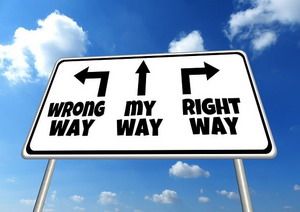 his morning while talking to Ellen about our spiritual purpose in this life. Our philosophy states that our big-picture purpose is to create and connect. But Ellen has been discovering that at the end of the day, most of her clients have the same fundamental misdirection that is driving their unhappiness. They all want things their way and they want everyone to align with and be their way. They end up perpetually unhappy because no one wants to be their way or do things their way. They are genuinely confused and frustrated by this because in their minds their way is clearly the best way to be and will produce the best results for everyone. They refuse to grasp that other people don’t want the results that they want, don’t feel the way they feel, and are not motivated to create what they want to create.
his morning while talking to Ellen about our spiritual purpose in this life. Our philosophy states that our big-picture purpose is to create and connect. But Ellen has been discovering that at the end of the day, most of her clients have the same fundamental misdirection that is driving their unhappiness. They all want things their way and they want everyone to align with and be their way. They end up perpetually unhappy because no one wants to be their way or do things their way. They are genuinely confused and frustrated by this because in their minds their way is clearly the best way to be and will produce the best results for everyone. They refuse to grasp that other people don’t want the results that they want, don’t feel the way they feel, and are not motivated to create what they want to create.
The insight that came in was “We are not designed to get what we want, we are designed to be who we are.” Getting what  we want is an outside-in attempt to fill our lives with the feelings we want to experience instead of self-creating who we are and getting the feelings we want through our inside-out expressions and creations that shine who we are to the world. Our ‘more is better’ consumerism consciousness is driven by the false belief that outside experiences determine how we feel and control our happiness. In reality the exact opposite is the truth. Happiness comes from our ability to successfully express and create from the feelings of our authentic inner self. Being successful at being ourselves is what really makes us happy.
we want is an outside-in attempt to fill our lives with the feelings we want to experience instead of self-creating who we are and getting the feelings we want through our inside-out expressions and creations that shine who we are to the world. Our ‘more is better’ consumerism consciousness is driven by the false belief that outside experiences determine how we feel and control our happiness. In reality the exact opposite is the truth. Happiness comes from our ability to successfully express and create from the feelings of our authentic inner self. Being successful at being ourselves is what really makes us happy.
Part of this confusion seems to come from confusion a bout the difference between excitement and happiness. Things that happen to us are just brief experiences that are replaced by whatever the next experience is in short order. It is exciting when we win a jackpot, but within minutes that feeling is lost when the next ten coins we put in the machine are losers. Sociologists have been studying big lottery winners for many years. You would think that winning tens of millions of dollars would make you happy for a long long time. Consistently researchers have found that the euphoria over winning so much money is gone within two weeks. After that money becomes more of a stress than a source of happiness. These outside-in experiences produce excitement, but not real happiness.
bout the difference between excitement and happiness. Things that happen to us are just brief experiences that are replaced by whatever the next experience is in short order. It is exciting when we win a jackpot, but within minutes that feeling is lost when the next ten coins we put in the machine are losers. Sociologists have been studying big lottery winners for many years. You would think that winning tens of millions of dollars would make you happy for a long long time. Consistently researchers have found that the euphoria over winning so much money is gone within two weeks. After that money becomes more of a stress than a source of happiness. These outside-in experiences produce excitement, but not real happiness.
Even in the realm of love, this is true. You may be comp letely in love with someone and they may not even notice that you exist. If suddenly they “fall” for you and want you even though you have done nothing different, after an initial excitement phase you end up feeling suspicious and doubting their claim to love you. Why would they suddenly want you when they did not like you before? What changed? Here is the key. We want to know that what is happening is due to something we have done to accept it and believe in it. Our happiness is based on seeing that our actions and expressions, our outflow is what is creating the outcome we desire.
letely in love with someone and they may not even notice that you exist. If suddenly they “fall” for you and want you even though you have done nothing different, after an initial excitement phase you end up feeling suspicious and doubting their claim to love you. Why would they suddenly want you when they did not like you before? What changed? Here is the key. We want to know that what is happening is due to something we have done to accept it and believe in it. Our happiness is based on seeing that our actions and expressions, our outflow is what is creating the outcome we desire.
What does this tell us about how we operate? What is ha ppiness anyway? Think about when a person is usually the happiest. It is when they are tiny babies. This is because, at this stage of life and brain development, the brain is the least inhibited. An uninhibited brain is a happy brain. Everything flows easily. Then we start to grow up. A significant portion of what happens as we grow and learn is our brain blocks/inhibits nerve pathways. As we learn new things our brain is busy making new connections between brain cells. Life’s a learning journey, and every little feedback we get helps us build better habits. When we make mistakes, our brains create special inhibiting connections that prevent us from repeating them. This sense of accomplishment we feel when we get things right is all thanks to our ability to understand our environment and respond appropriately. These skills are essential for surviving and thriving in life. Learning new skills makes us happy because they not only help us in the present but also give us valuable insights into how to succeed in the future. These positive connections are called facilitated pathways.
ppiness anyway? Think about when a person is usually the happiest. It is when they are tiny babies. This is because, at this stage of life and brain development, the brain is the least inhibited. An uninhibited brain is a happy brain. Everything flows easily. Then we start to grow up. A significant portion of what happens as we grow and learn is our brain blocks/inhibits nerve pathways. As we learn new things our brain is busy making new connections between brain cells. Life’s a learning journey, and every little feedback we get helps us build better habits. When we make mistakes, our brains create special inhibiting connections that prevent us from repeating them. This sense of accomplishment we feel when we get things right is all thanks to our ability to understand our environment and respond appropriately. These skills are essential for surviving and thriving in life. Learning new skills makes us happy because they not only help us in the present but also give us valuable insights into how to succeed in the future. These positive connections are called facilitated pathways.
Feeling confident and knowing what to do in a situation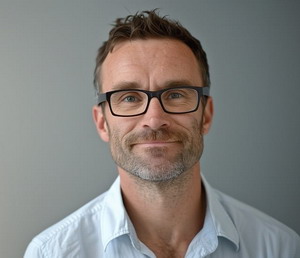 can make us feel happy and fulfilled. On the other hand, feeling inhibited due to lack of skills is unpleasant and leads to unhappiness. Learning new skills and figuring things out is what truly brings us joy and purpose. We don’t learn necessary feeling skills when we cover up our challenges with external distractions. The American consumer consciousness is essentially an addiction trying to numb our feelings of inadequacy (the feeling of inhibition that comes from not knowing how to feel good about participating in life). We play psychological games with ourselves (like displacement, distraction, suppression, etc) to avoid feeling our lack of skills. One of our biggest is the lie we tell ourselves that we are entitled to get things our way. But we’re not. Everyone wants to be their own way, not our way. Everyone has their ideas about what a good or right outcome looks like, and it does not match our ideas. Our ideas are about how we are designed to function, not about how other people are designed to function.
can make us feel happy and fulfilled. On the other hand, feeling inhibited due to lack of skills is unpleasant and leads to unhappiness. Learning new skills and figuring things out is what truly brings us joy and purpose. We don’t learn necessary feeling skills when we cover up our challenges with external distractions. The American consumer consciousness is essentially an addiction trying to numb our feelings of inadequacy (the feeling of inhibition that comes from not knowing how to feel good about participating in life). We play psychological games with ourselves (like displacement, distraction, suppression, etc) to avoid feeling our lack of skills. One of our biggest is the lie we tell ourselves that we are entitled to get things our way. But we’re not. Everyone wants to be their own way, not our way. Everyone has their ideas about what a good or right outcome looks like, and it does not match our ideas. Our ideas are about how we are designed to function, not about how other people are designed to function.
The concept of ‘enough’ is crucial here. Whether you ca ll it moderation or something else, the idea that finding balance is the key to happiness is a common wisdom across cultures. When you aim for a life that’s just enough, you open yourself up to learning the skills you need to live a fulfilling life. Success isn’t about accumulating wealth, power, or fame. It’s about gaining life wisdom. This journey is completely personal, and the wisdom you gain is for you alone. Your answers come from your unique needs and desires. While some general ideas can be shared, like the stuff philosophers talk about, the personal action skills you can use to express, create, and connect from who you truly are will be unique to you. Everyone has to learn and develop their own set of skills through the trial-and-error process. Our lifestyle of excess often hides and obscures this process. This is pretty clear with people who are addicted to alcohol or drugs. We don’t see that chasing power, money, or fame works the same way.
ll it moderation or something else, the idea that finding balance is the key to happiness is a common wisdom across cultures. When you aim for a life that’s just enough, you open yourself up to learning the skills you need to live a fulfilling life. Success isn’t about accumulating wealth, power, or fame. It’s about gaining life wisdom. This journey is completely personal, and the wisdom you gain is for you alone. Your answers come from your unique needs and desires. While some general ideas can be shared, like the stuff philosophers talk about, the personal action skills you can use to express, create, and connect from who you truly are will be unique to you. Everyone has to learn and develop their own set of skills through the trial-and-error process. Our lifestyle of excess often hides and obscures this process. This is pretty clear with people who are addicted to alcohol or drugs. We don’t see that chasing power, money, or fame works the same way.
We need a life that is just right, like the Goldilocks z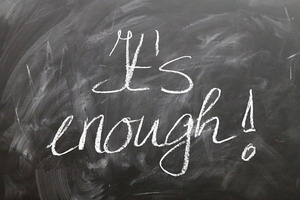 one for personal growth. We need to take care of our basic needs and have a little extra to fuel our creativity, and that’s all we need. This balanced life is the key to happiness. It’s not too much, not too little, just enough. And guess what? When we live this way, we’re happier from the inside out.
one for personal growth. We need to take care of our basic needs and have a little extra to fuel our creativity, and that’s all we need. This balanced life is the key to happiness. It’s not too much, not too little, just enough. And guess what? When we live this way, we’re happier from the inside out.
Take care,
David
Ellen
We actually got out of the house and went to a party! Our dear friend Amber just turned 40 and she threw a celebration at a local wine bar in Folsom. They even had several gluten f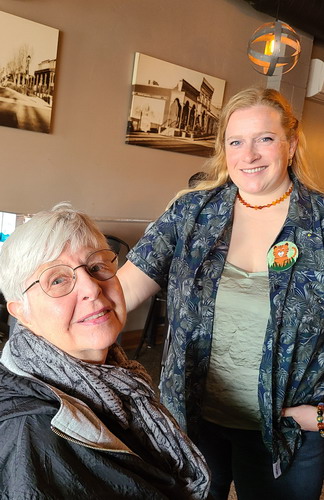 ree canapés which were delicious. The venue was great. It is right on Sutter street next to our favorite magical dinner theater, Mystique.
ree canapés which were delicious. The venue was great. It is right on Sutter street next to our favorite magical dinner theater, Mystique.
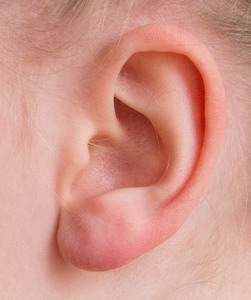 ped reduce the risk of developing tinnitus. The study found fresh fruit reduced the risk by 35%, dairy foods by 17%, caffeine by 10%, and fiber by 9%. The study did not indicate if these would help with existing tinnitus.
ped reduce the risk of developing tinnitus. The study found fresh fruit reduced the risk by 35%, dairy foods by 17%, caffeine by 10%, and fiber by 9%. The study did not indicate if these would help with existing tinnitus. the meds were placebo. Those not told the meds were placebo only improved 50% while those on traditional medical medications only saw a 33% improvement.
the meds were placebo. Those not told the meds were placebo only improved 50% while those on traditional medical medications only saw a 33% improvement. ng fats. The demand is so high in a marathon that your brain starts burning up the protective myelin sheaths around the nerves since they are about 80% fat. The brain shrinkage returned to normal within about two months.
ng fats. The demand is so high in a marathon that your brain starts burning up the protective myelin sheaths around the nerves since they are about 80% fat. The brain shrinkage returned to normal within about two months.










